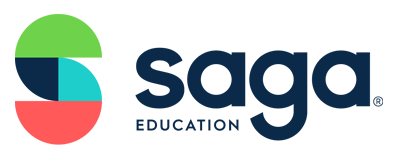MSDE is committed to strengthening mathematics outcomes and experiences for all students through evidence-based supports and by building sustainable systems that allow educators to deliver high-quality, responsive mathematics instruction. This commitment is anchored in
Maryland’s PreK–12 Mathematics Policy, which outlines a coherent instructional progression, a multi-tiered system of supports (MTSS), and a vision for all students to be college and career ready by the end of 10th grade.
As part of this strategic effort, MSDE has partnered with
Saga Education and
ASSISTments, two nationally recognized programs with strong evidence of impact. These partnerships, established through
The Maryland Fund to Scale Proven Programs, are supporting targeted improvements in middle and high school mathematics, particularly in algebra readiness and success. Together, they contribute to ensuring equitable access to high-quality, productive mathematics experiences—especially for students who have been historically underserved or who need additional support to thrive.
TARGET AREA
Algebra 1 | Grade 9
Algebra 1 is a critical milestone in a student’s academic journey. Students who struggle in Algebra 1 are significantly less likely to graduate—and less likely to pursue college and career pathways that require math.
MSDE is partnering with Saga Education to bring high-dosage, in-school tutoring to students who need more time, support, and encouragement to succeed in Algebra 1.
The tutoring provides students with personalized Tier 2 instruction, aligned closely with Tier 1 instruction to ensure consistency and preparation for core content learning. By offering intensive support during the school day, Saga helps create more equitable access to algebra success—a key gatekeeper to future academic and career opportunities.
KEY FEATURES
School-day integration—students receive tutoring without missing other instructional time
Strong focus on mentoring and relationship-building
Directly aligned with classroom instruction and readiness skills and understanding
Proven to boost student performance in
multiple large-scale studies
GOAL FOR MARYLAND
Embed Saga’s tutoring model into the daily operations of approximately 57 schools, reaching approximately 7,000 students by the 2027-28 school year.
TARGET AREA
Middle School Math / Algebra Readiness | Grades 6-8
To succeed in algebra, students need a strong foundation in middle school math. Effective formative assessment plays a critical role here by helping teachers understand what students know, what they’re ready to learn next, and how to adjust instruction in real time.
MSDE is partnering with ASSISTments, a digital platform that helps teachers and students use feedback effectively and supports schools in building strong, data-informed instructional practices. In Maryland, the initiative supports districts in using formative assessment not as an add-on, but as an integrated and essential part of Tier 1 instruction.
By reinforcing effective, curriculum-aligned instruction in the middle grades, ASSISTments expands access to productive learning experiences for students on the path to algebra readiness.
KEY FEATURES
Establishes school-wide systems for grade level standard-aligned formative assessment
Teachers get real-time data to guide instruction
Schools build systems for using assessment data in daily instruction
Independent studies show gains of up to 60% over expected annual progress
GOAL FOR MARYLAND
Support schools in using curriculum-aligned formative assessments as a core part of math instruction, with the goal of reaching 24,000 middle school students and expanding access to high-quality, responsive learning experiences that accelerate Algebra readiness.
The Saga Education and ASSISTments partnerships are core components of Maryland’s strategy to improve math achievement and opportunity statewide. They directly support the key priorities outlined in the state’s PreK–12 Mathematics Policy:
Strengthening PreK–8 numeracy, with a particular focus on the middle grades and early algebra—a critical phase for developing the knowledge and habits students need to become college and career ready by the end of 10th grade. These initiatives help ensure students receive timely support before they fall behind.
Supporting the development of MTSS by helping schools:
Build systems to monitor student progress continuously, identify learning needs, and adjust Tier placement in real time
Provide intensive, school-day supports, such as high-dosage tutoring and digital formative assessment, that are integrated with Tier 1 instruction and aligned to the core curriculum These initiatives will play an important role in operationalizing MTSS statewide.
Preparing students to be ready for Maryland’s new secondary mathematics pathways, which begin in 11th grade and are aligned to students’ individual goals and interests. By improving early math outcomes, these partnerships help broaden access to meaningful, future-ready math opportunities.
653 students
receiving school-day High School math tutoring
LEA Partner:
Baltimore City Public Schools

2,766 students
using the digital formative assessment platform
LEA Partners:
Baltimore County Public Schools
Charles County Public Schools

3,419 students
across Maryland
Initial implementation targets exceeded in both initiatives
In 2025 and beyond, MSDE will continue working with Saga Education and ASSISTments to:
Expand to additional schools and districts
Analyze student outcomes and share findings
Strengthen school systems that support continuous math growth
Use lessons learned to inform statewide improvements in math education
These initiatives are not just interventions—they are part of Maryland’s long-term strategy to raise math achievement and ensure every student has the opportunity to succeed.